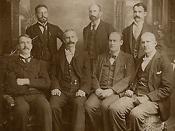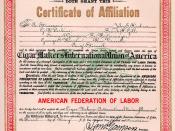Labor Laws and Organized Labor
Let's start way back at the beginning. The history of the Organized labor dates back to early America.
The first factory workers were predominately immigrants, slaves and children and they were easily exploited by many factory owners. Slaves had no constitutional rights and were treated at the will of their owners.
Immigrants lacking the funds for passage to the United States, often signed indentured servant contracts. These contracts allowed factory owners to pay the immigrant's passage the individual would agree to repay their debt by working in the owners factory after they arrived in the United States. They were traditionally required to live in company-owned housing and their rents were deducted from their wages. Because of the low wages paid, the immigrants often were forced to borrow money from their employers in order to purchase their basic necessities. As a result of the poor wages, high rents and the loans from their employers, they were seldom able to repay the factory owners, and in effect became slaves.
Workers were customarily required to work between 75 and 80 hours per week.
The first unions in the United States were predominately "craft unions" that represented specific trades, (i.e. Shoemakers, Blacksmiths, Tinsmiths, etc.). The first known union formed in the United States was organized by Shoemakers, or Cordwainers as they were known, in 1792. Their goal was to improve working conditions and wages. They were forced to strike six times and unfortunately failed to win their demands. In retaliation, the strikers were charged with "criminal conspiracy". The charges were dropped on the condition that they returned to work and fully reimbursed employers for all costs related to the strike.
In 1869, the Noble Order of the Knights of Labor was formed to organize "unskilled" labors. One of their...


